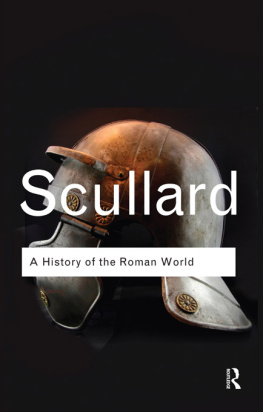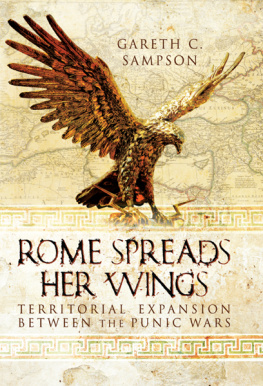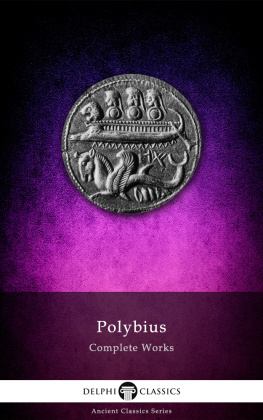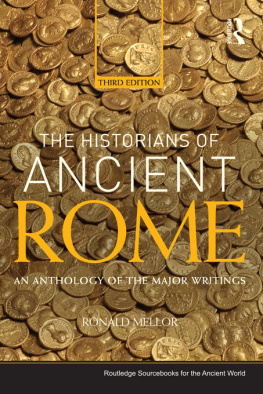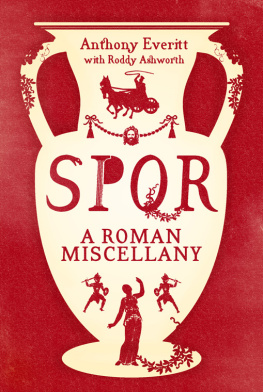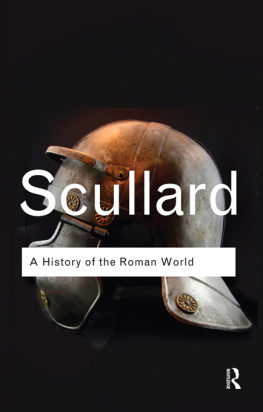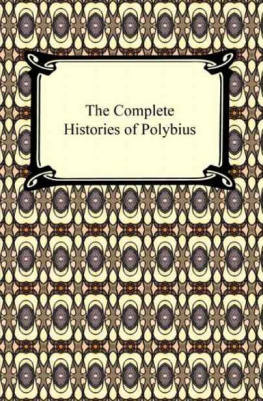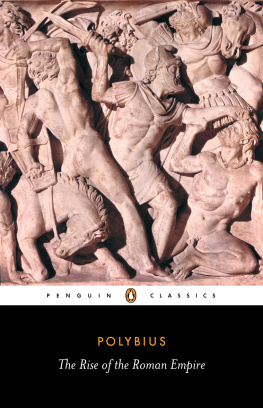Polybius and Roman Imperialism
Donald Walter Baronowski

Bloomsbury Academic
An imprint of Bloomsbury Publishing Plc
50 Bedford Square | 1385 Broadway |
London | New York |
WC1B 3DP | NY 10018 |
UK | USA |
www.bloomsbury.com
First published in 2011 by Bristol Classical Press
an imprint of Bloomsbury Academic
Reprinted by Bloomsbury Academic 2013
Donald Walter Baronowski, 2011
Donald Walter Baronowski has asserted his right under the
Copyright, Designs and Patents Act, 1988, to be identified
as Author of this work.
All rights reserved. No part of this publication may be reproduced
or transmitted in any form or by any means, electronic or mechanical,
including photocopying, recording, or any information storage
or retrieval system, without prior permission in writing
from the publishers.
No responsibility for loss caused to any individual or organization
acting on or refraining from action as a result of the material in this
publication can be accepted by Bloomsbury or the author.
British Library Cataloguing-in-Publication Data
A catalogue record for this book is available from the British Library.
eISBN-13: 978-1-4725-1987-0
Library of Congress Cataloging-in-Publication Data
A catalog record for this book is available from the Library of Congress.
Contents
Part I. The Attitude of Intellectuals to Imperial
Domination in the Hellenistic Period
Recessional
God of our fathers, known of old,
Lord of our far-flung battle-line,
Beneath whose awful Hand we hold
Dominion over palm and pine
Lord God of Hosts, be with us yet,
Lest we forget lest we forget!
The tumult and the shouting dies;
The Captains and the Kings depart:
Still stands Thine ancient sacrifice,
An humble and a contrite heart.
Lord God of Hosts, be with us yet,
Lest we forget lest we forget!
Far-called, our navies melt away;
On dune and headland sinks the fire:
Lo, all our pomp of yesterday
Is one with Nineveh and Tyre!
Judge of the Nations, spare us yet,
Lest we forget lest we forget!
If, drunk with sight of power, we loose
Wild tongues that have not Thee in awe,
Such boastings as the Gentiles use,
Or lesser breeds without the Law
Lord God of Hosts, be with us yet,
Lest we forget lest we forget!
For heathen heart that puts her trust
In reeking tube and iron shard,
All valiant dust that builds on dust,
And guarding, calls not Thee to guard,
For frantic boast and foolish word
Thy mercy on Thy People, Lord!
From Rudyard Kiplings Verse. Definitive
edition (London: Hodder and Stoughton,
1940; reprinted 1960)
Preface
The aim of this book is to explore the complexity and ambivalence of Polybius views about Roman imperialism. Although many scholars have discussed or commented on various aspects of this problem, there exists no general treatment showing how the Achaean historian relates to his intellectual milieu and how his acceptance of imperialism and his admiration of Roman power were tempered by manifestations of intellectual independence vis--vis the imperial nation. The present study is designed in some measure to supply the need for a broader investigation of a question so often debated among contemporary historians of antiquity. It shares with C.B. Champion, Cultural Politics in Polybiuss Histories (Berkeley 2004), a vision of the ancient historian as a writer who expresses complex attitudes about Rome. While Champion focuses on Polybius varying representation of the Romans as civilized or uncivilized, my own study concentrates on the question of how he reacted to the expansion of Roman power over other peoples, and to what extent he identified himself with the ruling nation.
The Introduction includes a short biography of Polybius, a brief discussion of the chronology of the Histories as well as the Romans view of Polybius, a survey of scholarly opinion regarding his judgement of Roman imperialism, and observations on his conception of the Roman arkh and how this is related to modern conceptions of imperialism. ) in the third, second and first centuries BC.
).
On the other hand, the Achaean historian also evinced a certain distance intrieure with regard to Rome. This is evident from the abstract principles that he advocates relating to imperialism, from his view of the aggressive drive underlying this phenomenon, and from his occasional criticism of Roman policy ().
The Conclusions summarize the arguments put forward in the main body of the book and add further observations on several points. In fine Polybius, who preserved his intellectual independence and integrity, deserves the understanding and respect of modern readers.
Polybius maintained that, in the sphere of international relations, power should be exercised with justice, moderation and beneficence for the advantage of great and weak alike. This doctrine, proclaimed when Rome was the only great power in the Mediterranean world (though not the only significant one), suggests the continuing relevance of Polybius for our own times.
Although this book is intended primarily for students and scholars working in the fields of ancient Greek and Roman history and literature, I hope it will also attract a wider audience, including persons interested in political thought, international relations and historiography. In my study of Polybius I have used the edition of Buettner-Wobst. All translations from the Histories are my own.
In the fourteen years that I have worked on this study of Polybius and Roman imperialism, I have been privileged to enjoy the encouragement, advice and assistance of colleagues and friends, among them Beaudoin Caron, Zhongping Chen, Eric Csapo, Damien Janos, George Kirikopoulos, Georgii Mikula, Margaret Miller, Robert Morstein-Marx, John Porter, Wade Richardson, Lionel Sanders, Eva Steinlauf, Michael Swan and Michael Woloch. Arthur Eckstein, Michael Silverthorne and George Snider read an advanced draft of my book. I am grateful to these three scholars and to the publishers anonymous reader for their valuable suggestions, comments and criticism, which greatly improved the quality of my work. I alone, of course, am responsible for persisting errors and the defects of ignorance, inadvertence and obstinacy.
Arthur Eckstein has persuaded me to reconsider my earlier views about pretexts in Polybius. The elaboration of my study of the Jewish-Christian Sibylline oracles springs from the advice of Gregory Nagy. Lionel Sanders inspired me to reflect on the complexities and contradictions of the heart and mind, a human characteristic that must be considered in any attempt to understand the political ideas and historical attitudes of the elusive Polybius. Michael Silverthorne encouraged me to learn about Greek and Roman political theory. Among my teachers, I am particularly indebted to Colin Gordon and Michael Woloch, who encouraged my first steps in ancient history, to William Dusing for guiding my earliest study of the sources for the period treated by Polybius, and to Peter Derow and Graham Sumner for instilling in me an interest in that author as an historian and thinker.



